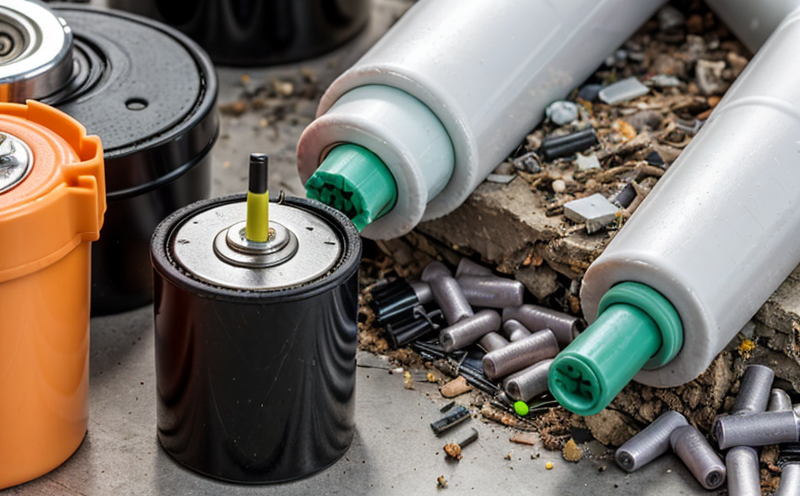ISO 21068 Chemical Analysis Testing of Spent Battery Electrolytes
The ISO 21068 standard is pivotal in ensuring that the chemical composition and safety parameters of spent battery electrolytes are accurately determined. This service at Eurolab involves a comprehensive approach to testing, which includes sample collection, preparation, analysis, and reporting.
During this process, our experts meticulously collect samples from various sources such as recycling plants, manufacturing facilities, or end-of-life batteries. These samples are then prepared for analysis according to the stringent requirements outlined in ISO 21068. The primary goal is to ascertain the presence and concentration of key chemical components including metals like lithium (Li), nickel (Ni), cobalt (Co), manganese (Mn), and other relevant elements.
The testing methodology involves multiple steps, starting with a preliminary examination of the battery electrolyte using spectroscopic techniques. This is followed by more detailed analyses such as inductively coupled plasma mass spectrometry (ICP-MS) for precise quantification of trace metals. Additionally, voltammetry and potentiometric titrations are employed to evaluate redox properties and pH levels.
Our laboratory adheres strictly to ISO 21068 guidelines to ensure reliable results. Compliance with these standards is crucial not only for regulatory purposes but also for optimizing the recovery processes in battery recycling. Understanding the chemical composition of spent electrolytes allows for more efficient extraction methods, reducing waste and environmental impact.
The importance of this service extends beyond mere compliance; it plays a critical role in advancing sustainable practices within the battery industry. By providing accurate data on the chemical makeup, manufacturers can better design recycling systems that maximize resource recovery while minimizing ecological footprint.
Applied Standards
| Standard Name | Description |
|---|---|
| ISO 21068-1:2017 | Chemical analysis of spent batteries and battery cells - Part 1: General principles. |
| ISO 21068-2:2017 | Chemical analysis of spent batteries and battery cells - Part 2: Sampling and preparation. |
| ISO 21068-3:2017 | Chemical analysis of spent batteries and battery cells - Part 3: Determination of lithium. |
| ISO 21068-4:2017 | Chemical analysis of spent batteries and battery cells - Part 4: Determination of nickel. |
| ISO 21068-5:2017 | Chemical analysis of spent batteries and battery cells - Part 5: Determination of cobalt. |
| ISO 21068-6:2017 | Chemical analysis of spent batteries and battery cells - Part 6: Determination of manganese. |
Eurolab Advantages
At Eurolab, we pride ourselves on offering unparalleled expertise in battery recycling and end-of-life testing. Our cutting-edge facilities are equipped with state-of-the-art instrumentation that ensures precise and accurate results every time.
Our team of highly skilled analysts is dedicated to providing thorough and reliable chemical analysis services based on ISO 21068 standards. We understand the complexities involved in battery recycling and can offer tailored solutions to meet your specific needs.
We ensure that all our testing protocols are strictly followed, guaranteeing compliance with international standards. This not only helps you avoid potential penalties but also enhances your reputation as a responsible industry leader.
Moreover, we provide comprehensive reports detailing the results of each analysis, complete with recommendations for further actions if necessary. Our commitment to excellence is reflected in our unwavering dedication to quality and customer satisfaction.
International Acceptance and Recognition
The ISO 21068 series of standards has gained widespread acceptance across the globe, making it a benchmark for chemical analysis in spent battery electrolytes. Compliance with these standards is essential not only for meeting regulatory requirements but also for ensuring that recycling processes are efficient and environmentally friendly.
Our service at Eurolab ensures that you meet all necessary criteria set by international bodies such as the European Union, United States Environmental Protection Agency (EPA), and others. By adhering to these standards, we help you stay ahead of regulatory changes and maintain a competitive edge in the market.
The recognition of ISO 21068 by global organizations underscores its importance in promoting sustainability within the battery industry. Our service is designed to ensure that your operations align with these recognized standards, thereby contributing positively to environmental conservation efforts.





